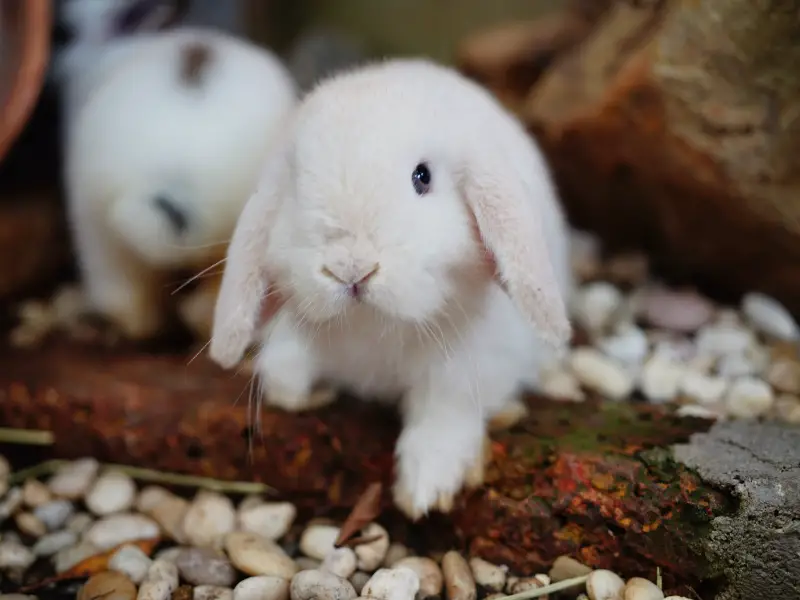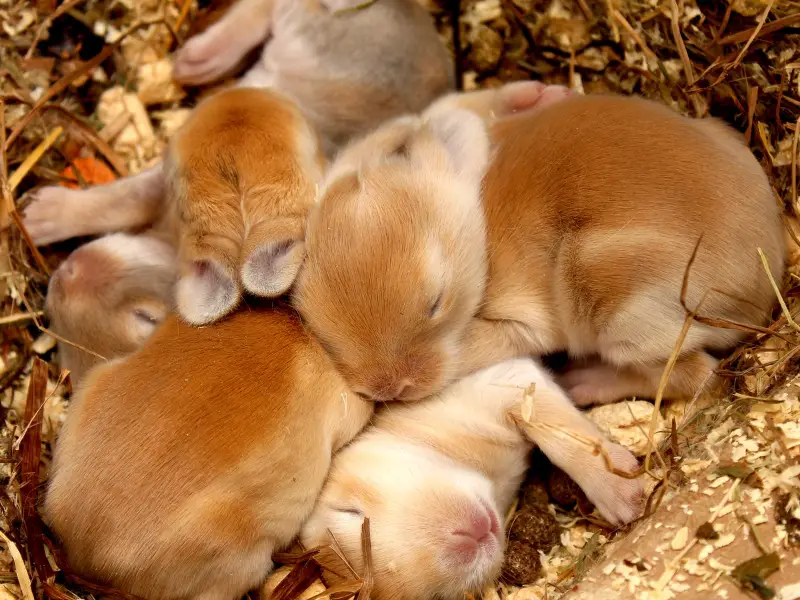Male rabbits are known for their territorial behavior, and it is often believed that they cannot stay with babies. However, this is not entirely true. In some cases, male rabbits can coexist with their offspring without any issues.
It is essential to understand that male rabbits have a natural instinct to protect their territory and can be aggressive toward other rabbits, including their own offspring. However, this behavior is not always the case. In some cases, male rabbits can be gentle and nurturing towards their young. It is crucial to observe the behavior of the male rabbit before introducing him to the babies.
In this article, we will explore the factors that determine whether a male rabbit can stay with babies. We will also discuss the steps that rabbit owners should take to ensure the safety and well-being of both the male rabbit and the babies.
Do Male Rabbits Kill Baby Rabbits?

Male rabbits, also known as bucks, can sometimes exhibit aggressive behavior towards baby rabbits, also known as kits. This behavior can include attacking, biting, or even killing the kits. However, not all male rabbits exhibit this behavior, and there are several factors that can influence whether or not a male rabbit will harm its offspring.
One of the main factors that can influence whether or not a male rabbit will kill its offspring is the age of the kits. If the kits are very young, the male rabbit may not recognize them as its own and may view them as a threat. In this case, it is best to keep the male rabbit separated from the kits until they are older and more developed.
Another factor that can influence whether or not a male rabbit will kill its offspring is the temperament of the rabbit. Some male rabbits are more aggressive than others and may be more likely to attack or harm their offspring. It is important to observe the behavior of the male rabbit before allowing it to interact with the kits.
Additionally, the size of the enclosure can also play a role in whether or not a male rabbit will harm its offspring. If the enclosure is too small, the male rabbit may become territorial and view the kits as a threat. Providing a larger enclosure can help to reduce the risk of aggression towards the kits.
In conclusion, while male rabbits can exhibit aggressive behavior towards their offspring, not all male rabbits will harm their kits. Factors such as the age of the kits, the temperament of the male rabbit, and the size of the enclosure can all play a role in whether or not a male rabbit will harm its offspring. It is important to observe the behavior of the male rabbit and take appropriate measures to ensure the safety of the kits.
Do Male Rabbits Eat Their Babies?
Male rabbits, like female rabbits, have a natural instinct to protect their young. However, there have been instances where male rabbits have been known to eat their babies. This behavior is not common, but it can occur for several reasons.
One reason why male rabbits may eat their babies is stress. If the male rabbit is stressed, it may become aggressive and attack its young. This can happen if the male rabbit is in an overcrowded or unfamiliar environment.
Another reason why male rabbits may eat their babies is due to a lack of food. If the male rabbit is not getting enough food, it may resort to eating its young to survive. This can happen if the male rabbit is not being fed enough or if there is a shortage of food in its environment.
It is important to note that not all male rabbits will eat their babies. In fact, many male rabbits are great fathers and will help care for their young. However, it is important to monitor the behavior of male rabbits when they are around their young to ensure that they are not exhibiting any aggressive or unusual behavior.
In conclusion, while it is not common for male rabbits to eat their babies, it can happen for several reasons such as stress or a lack of food. It is important to monitor the behavior of male rabbits around their young to ensure the safety of the babies.
Can a Male Rabbit Stay with a Pregnant Rabbit?
Male rabbits, also known as bucks, can stay with a pregnant rabbit, also known as a doe. However, it is important to note that male rabbits can be territorial and may become aggressive toward the doe and her babies.
It is recommended to separate the male rabbit from the pregnant doe before she gives birth. This will prevent any potential harm to the babies and ensure their safety.
Once the babies are born, it is still not recommended to immediately reintroduce the male rabbit to the doe and her babies. The doe will need time to recover from giving birth and bond with her babies.
It is best to wait at least four to six weeks before reintroducing the male rabbit to the doe and her babies. This will give the babies time to grow and develop, and the doe time to establish a bond with her babies.
In summary, while male rabbits can stay with a pregnant rabbit, it is recommended to separate them before the doe gives birth and to wait at least four to six weeks before reintroducing the male rabbit to the doe and her babies.
Why Should You Separate the Male Rabbit from the Doe?
Male rabbits can be territorial and aggressive, especially when they are around females and their babies. It is important to separate the male rabbit from the doe to prevent any harm from happening to the babies or the mother. Here are a few reasons why you should separate the male rabbit from the doe:
1. To prevent fighting
Male rabbits can become aggressive toward other rabbits when they are in close proximity. This is especially true when they are around females and their babies. Separating the male rabbit from the doe can prevent any fighting from occurring and ensure the safety of the babies.
2. To prevent injuries
Male rabbits have strong hind legs and can cause serious injuries to other rabbits if they feel threatened. Separating the male rabbit from the doe can prevent any injuries from occurring and ensure the safety of the babies.
3. To prevent unwanted pregnancies
Male rabbits can impregnate females as early as 3 months of age. If left with the doe and her babies, the male rabbit can impregnate the female again, leading to unwanted pregnancies and overcrowding. Separating the male rabbit from the doe can prevent any unwanted pregnancies from occurring and ensure the health and well-being of the rabbits.
In conclusion, separating the male rabbit from the doe is important to prevent fighting, injuries, and unwanted pregnancies. It is recommended to separate the male rabbit from the doe as soon as the babies are born to ensure their safety and well-being.
When should I separate my male and female baby rabbits?
It is important to separate male and female baby rabbits as soon as they reach sexual maturity, which is typically around 3-4 months of age. If they are not separated, the male rabbit can impregnate the female, leading to unwanted litter and potential health problems for the mother rabbit.
It is also important to note that male rabbits can become aggressive towards baby rabbits, regardless of their gender. This aggression can lead to injuries and even death, so it is recommended to separate the male rabbit from the babies once they are weaned and able to survive without their mother.
If you are unsure about the sex of your baby rabbits, it is best to consult with a veterinarian or experienced rabbit breeder to determine their gender and make sure they are separated appropriately.
In summary, it is important to separate male and female baby rabbits once they reach sexual maturity to prevent unwanted litters and potential health problems. Additionally, male rabbits can become aggressive towards baby rabbits, so it is recommended to separate them once the babies are weaned and able to survive without their mother.
Conclusion
In conclusion, male rabbits can stay with babies under certain circumstances. However, it is important to note that male rabbits can be aggressive towards young ones, especially if they are not the biological father.
If the male rabbit is the biological father of the babies, he is more likely to be accepting of them. However, if the male rabbit is not the biological father, it is best to separate him from the babies to prevent any harm.
Additionally, it is important to ensure that the male rabbit is neutered before allowing him to stay with babies. This will reduce the chances of him becoming aggressive and protect the babies from any unwanted mating behavior.
Overall, it is crucial to monitor the behavior of male rabbits around babies and take necessary precautions to ensure the safety of the young ones.
Related Articles:

